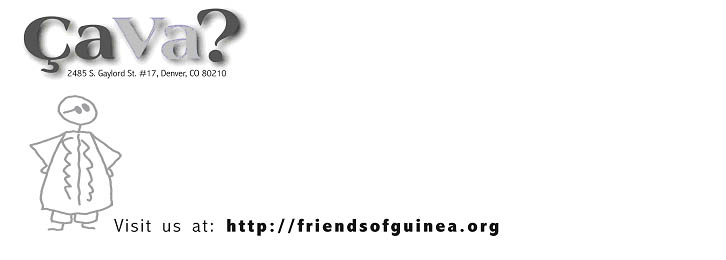
15 November 2005
Back to Friends of Guinea page or Back to Ca Va page or Download PDF version
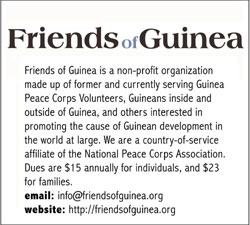
|
|
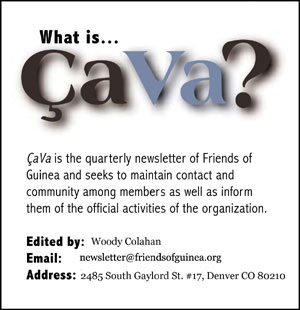 |
Guinea RPCVs Serve in Katrina Relief Effort
By Jesse Fleisher (Labe/Conakry 2002-05)
tchibanga2000 @ yahoo.com
Guinea RPCVs Jesse Fleisher, Kelly Hamblin, and Jeanette Montour served for one month earlier this year as Crisis Corps Volunteers in Thibodaux, Louisiana . Guinea RPCV Jamaica Corker served for one month as a CCV in Gulfport , Mississippi , and Guinea RPCV Kent Brown is currently serving as a CCV somewhere in Louisiana . Jesse sent us the following account of his experience, helping people and also dealing with many of the same frustrations any PCV knows.
 |
As many probably know already, Peace Corps issued an unprecedented emergency request for Crisis Corps Volunteers to serve 30 day assignments in the aftermath of Hurricane Katrina this year. The skills requested included the “ability to interact with a variety of people,” and “to manage large workloads with quick turnaround deadlines in highly stressful and emotional situations,” and the job description further mentioned the possibility of “extensive travel in remote or poorly equipped locations” and finally noted that the positions would “often involve irregular hours, substantial overtime, and high stress conditions.” Apparently, more than 400 RPCVs thought that all that sounded pretty good to them, and amongst them were at least 5 recent Guinea RPCVs who jumped at the chance to help with the hurricane relief efforts in Louisiana and Mississippi .
This assignment marked the first time that Peace Corps Volunteers of any kind have ever been deployed for service inside the United States , and was also significant for the speed with which Peace Corps acted. I, for one, applied early on a Saturday morning via email, had a telephone interview a few hours later, had my references checked a few minutes after my interview, and received my medical forms to fill out via fax. By Sunday afternoon I had been medically cleared, by Monday morning I had my travel authorization and plane tickets, and by early Tuesday morning I had my “living allowance” in my bank account and was on a plane bound for a FEMA training/operations center in Orlando , Florida . Once there, I met up with other RPCVs, was immediately sworn in as an official Crisis Corps Volunteer, and got some more information about the nature of our impending assignment. Four days from initial application to swearing in – I was impressed!The FEMA training center was a study in barely controlled chaos and bureaucracy, and after 2 days of security clearance procedures and rudimentary FEMA training, it became clear that we would be doing a lot of on-the-job learning. Our assignment: Individual Assistance – A designation that meant we would be the front line personnel of FEMA’s disaster recovery efforts. (Essentially, emergency social workers, disaster survivor advocates, and relief services agents).
Our training group flew with 245 fire fighters on a chartered jet from Orlando to Baton Rouge, Louisiana, and we were ushered by bus from the frenzied relief operations headquarters where we checked in with a supervisor (who hadn’t known we were coming) to an enormous military tent camp that we shared primarily with firemen, military personnel, and U.S. Public Health Service agents. After a day of working at an enormous animal shelter in a stadium at Louisiana State University , and another day working with the Red Cross and other groups in the utterly devastated town of Slidell , Louisiana , we were finally split into smaller groups called “strike teams,” and given our primary tasks.
I was assigned, along with Guinea RPCVs Kelly Hamblin and Jeanette Montour, a gaggle of firefighters from around the country, and a few FEMA employees, to take over a department store in Thibodaux , Louisiana , and turn it into a functional Disaster Recovery Center .
Once up and running, we were joined under the same roof by two other Crisis Corps Volunteers as well as personnel from agencies including FEMA, the USDA, the US Postal Service, the IRS , the Army Corps of Engineers, the Small Business Administration, the Social Security Administration, Medicare, federal and local food stamps agencies, crisis counselors, child welfare agencies, elderly services, Habitat for Humanity, emergency employment and housing groups, etc.
Our role as Crisis Corps Volunteers was to meet one on one with hurricane victims, interview them, listen to their stories, look at their pictures, and then provide them with information and referrals, help them solve individual issues and problems, and finally make some basic eligibility determinations regarding relief services for which they might be eligible.
Essentially what we did was a combination of listening and comforting, advocating for those in need, helping people to navigate the constantly changing and outrageously user-unfriendly processes required to get emergency relief assistance, and generally acting as a buffer between the hurricane victims and the well meaning, but mildly adversarial FEMA bureaucracy. Most of the people we worked with were from New Orleans and coastal areas of Louisiana and Mississippi , though after weathering Hurricane Rita (another adventure!), we began seeing people displaced from Texas as well. Interestingly, we were the only people in the building who spoke French, and we got to use our skills several times a day to work with older Cajun men and women who spoke little or no English.
The consensus amongst the Guinea RPCVs who served in Louisiana and Mississippi seems to be that we all feel grateful to have had the opportunity to help people in whatever small ways we could, but that we also share some frustrations about working within a system that was completely overwhelmed by the scope of the disaster. As is true with most of our Peace Corps experiences, we wanted to help people more than we were able to, and the obstacles to greater success, both natural and man-made, were larger than our abilities as individuals or even as a group to overcome them. Hard times bring out both the best and the worst in people, and we certainly experienced both extremes. We saw people who deserved and desperately needed help falling through the cracks, and people who didn’t need help at all cashing checks. We witnessed and experienced acts of extraordinary kindness and grace, and also acts of extreme ugliness. We learned some new jokes, handed out a lot of tissues, got a few hugs, and also got called a few nasty names. We got a sobering reminder of the power of nature, and also observed first hand how little removed America really is from the developing world when our systems of infrastructure, law, and order break down. It was a fascinating, difficult, wonderful experience, and I’m pretty sure we would all sign up to do it again.
Guinea Six
By Tom Creecy ( Conakry , ’66)
[email protected]
Tom Creecy was a volunteer in Guinea in the Sixties. We are grateful to him for sharing his recollections with us here.
Forty years ago this month, I began Peace Corps training for Guinea . I remember, upon arrival, asking the guy next to me how a diesel worked. He seemed shocked, but was polite about it.
Guinea Six, which arrived in Conakry in February, 1966, was the Peace Corps' first "Blue Collar" program. The idea behind it, originated and promoted by Guinea's first Peace Corps director, Henry Norman, was that Africa needed to learn less about English grammar and more about diesel trucks and tractors, while Peace Corps needed fewer fresh college kids and more seasoned technicians for its African programs.
Stateside, a big effort was made to recruit from the trades. The search and subsequent program were partially underwritten by the U.A.W. The recruiting drive was not as successful as hoped. Our program focused on diesel mechanics, but included welders, auto mechanics, electricians.
The master plan was that we would set up a series of equipment repair stations for the Public Works Department. The project had some magnificent four wheel drive trucks, and three diesel truck-mounted fold-out repair shops.
Due to a shortage of real technical talent, our group included some well-intended but technical-novitiate college kids like me. Because a lot of us didn't know much diesel, and those who did diesel did not do French, training was remarkably expensive. Our training lasted six months, and took place in multiple locations.
To my thinking, the major difference between our attitude back then and that reflected today by contributors to ÇaVa? is that we actually expected to help Africa develop. We were less intent upon enjoying the local culture, and more intent upon its mechanization. And, despite being warned in training against great expectations, many of us secretly thought we'd transform the place.
A second difference was that relations between the USA and Guinea , which latter was then firmly within the Soviet zone of influence, were very poor despite the ambitions of the U.S. to win hearts and minds. Countries split cleanly along cold-war lines in those days. Suspicion about the USA and about us brought the Government of Guinea to change its mind about our project about 10 days before we arrived. There was, in a word, no project. There were also no internal travel visas, so we couldn't leave Conakry .
A third difference was that Sekou Touré's experiment in African socialism was in full flower, and absolutely nothing worked. The nation was down to one locomotive, food was short, hard goods were non-existent, except for a plethora of East German bidets. The main post office and the East German brewery regularly ran out of (respectively) stamps and bottle caps. And the American-made buses that still ran had to be push-started.
A fourth difference was that the Touré regime did its best to emulate the Joe Stalin version of socialism, so, as a resident, you couldn't really go anywhere or see or do anything. The cross-cultural experience was limited since people you'd invite over might subsequently disappear. No travel past Kindia was allowed without a permit. You weren't allowed to take pictures. Food allocation to the general citizenry was controlled by the party's local political instrument, the Comité. Rice transport was strictly regulated. Lots of official spying, arrests, beatings; a few deaths.
This combination brought a number of our more technically acute people to give up and leave within the first month or two. Their farewell addresses made the point that they could be more useful to mankind at home, where food was considerably more plentiful and where girlfriend and hearth awaited.
The college kids among us, considerably less focused in life, stayed until the end. All thumbs as a technician, but glib in French, I taught, running a training school at the bus company in Conakry, doubtless with great sincerity, doubtless leaving little behind of lasting interest.
The end came early. We were eventually kicked out, along with members of Guinea 4 & 5, because the Government of Ghana, after bouncing Kwame N'Krumah from office, decided to arrest some Guinean delegation members at the airport while they were en route to a Pan-African conference in Addis. The airplane from which the delegates were forcibly de-planed was owned by Pan Am, so the USA was held accountable.
At this point, some of us went home. Others, me included, went on to Tunisia or Togo or Gabon to finish up our two years.
After completing J-school, I went back into the new mechanics program in Guinea in '69-71. This, predictably, ended up a repeat of the first experience, only with more government terror as the aftermath of the failed coup of 1971. Another oddity of the time: we helped some people escape to Sierra Leone and Liberia . That was probably my only lasting contribution.
Upon return Stateside, many of the Real Techies got out of the technical trades and into various white collar endeavors. One worked for the Minnesota Governor's office. Another eventually went to college, got a Masters in accounting, and today owns a company that formats airplane operator's manuals for the Air Force. I, by contrast, Technical Airhead of 1965, got fond of mechanical things. I started professional life working in Algeria , Tunisia and Morocco for a U.S. tractor manufacturer. The tractors were diesels. Forty years after that, thanks to my time in Guinea , I own a tall mahogany statue of a Fulani woman carrying a strapped-on baby, and a company that builds cleaning machinery.
IFESH: Moving Mountains in Guinea
by Ramya Vivekanandan, TFA 2003-04
ramyaviv @ yahoo.com
We all know Peace Corps is not the only organization supporting communities in Guinea . Ramya Vivikenandan shares the experience of an organization she has worked with, IFESH.
The International Foundation for Education and Self-Help (IFESH) embraces the spirit and vision of its founder, the late Rev. Leon H. Sullivan (1922-2001). Sullivan, who was former pastor of the Zion Baptist Church in Philadelphia , founder of the Opportunities Industrialization Centers (OIC) and author of the Sullivan Principles, committed his life to the struggle for freedom and equality in the United States , Africa and other parts of the world. From the coal-mining valleys of West Virginia to the frontlines of corporate America to the back alleys of Soweto , Sullivan worked tirelessly throughout his life to promote a vision of community-based sustainable development that is built on the principles of self-reliance.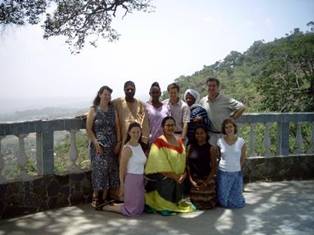 |
This premise and the idea that citizens must be literate and capable of making informed choices and that education and training must be the cornerstones of economic and social reform form the backbone of IFESH. Now based in Phoenix, Arizona and led by
Sullivan’s daughter Dr. Julie Sullivan, IFESH has a mission “to establish and maintain programs and governance that will help sub-Saharan African nations to reduce poverty and unemployment and build civil activities in the areas of education and health, business and economic development, and democracy and societies.” Its flagship initiatives are the Teachers for Africa (TFA) program and the International Fellows program, which both evolved out of the 1991 African-African American Summit convened by Sullivan in the Ivory Coast. Through the TFA program, volunteer American teachers, school administrators and professors are assigned to spend an academic year (generally nine-ten months) in Africa to help improve the educational systems of selected sub-Saharan African countries (Benin, Djibouti, Ethiopia, Ghana, Guinea, Ivory Coast, Malawi and Namibia at present). The International Fellows program recruits volunteer young professionals with an interest in international development to spend nine months working with various NGOs. A major feature of both programs is the recruitment and placement of qualified minority applicants.
IFESH began its involvement in Guinea in 1999 under a Cooperative Agreement with USAID and agreement with the Government of Guinea and relevant ministries. The first group of TFAs and Fellows served in Guinea during the 2000-01 academic year, and four subsequent groups have been fielded, making for a total of 35 volunteers (28 TFAs and 7 Fellows) who have served in Guinea under the IFESH banner. The TFAs generally work in either the teaching training colleges (écoles normales d’instituteurs or ENI) to train primary school teachers or the high schools (lycées) to teach English. Most TFAs in Guinea have worked in the Fouta Djalon region (Labé, Pita and Dalaba), though a few have been placed in Conakry to work with the Ministry of Pre-University and Civic Education’s National Equity Committee and the Institut Supérieur des Sciences de l’Education en Guinée (ISSEG). The Fellows have traditionally worked with Africare (in either Dinguiraye or Conakry) and OIC/Guinea. Like all IFESH volunteers, the Guinea TFAs and Fellows undergo a one-week orientation program in mid-August at IFESH headquarters in Phoenix. They arrive in Guinea in late August or early September and spend two weeks doing an in-country orientation in Conakry before departing for their respective assignments.
When asked to reflect upon their experience with IFESH in Guinea, former TFAs and Fellows had much to say! Like any visitor to Guinea, IFESH volunteers are amazed by the hope and resilience that they witness in their students, colleagues and communities. Ken Rampino, 2003-04 Fellow with Africare, spoke of his work with a food security initiative in Dinguiraye. Despite severe seasonal food shortages and devastating poverty traps, the communities with whom Rampino worked were deeply committed and engaged in Africare’s self-help activities such as agricultural training and community gardens. He gave the example of Kadia N’diaye, the president of a women’s group in WalawalaVillage that is running a successful community garden. From an area that was completely fallow years ago, N’diaye and her neighbors now produce “rows and rows of stupendous tomatoes, eggplants, lettuce and onions,” thus obtaining all the vegetables needed for their household consumption needs as well as raising enough money to establish a groups savings fund. Stories such as this one made Rampino realize that with faith and perseverance, people can take on and overcome even life’s “most fundamental problems.” Meghan Gallagher, 2004-05 TFA at the Centre Universitaire de Labé, also spoke of the amazing feats accomplished by those facing daunting challenges. Of her students, Gallagher says: “They struggle to improve their knowledge without books or documents. As electricity is non-existent and kerosene often too expensive, students study by candlelight. The well water is often causes parasitic illnesses among the student population. The year has been complicated by teacher and student strikes and demonstrations. Despite the challenges, my students remain motivated and optimistic…They are pursuing an education with the distant hope of a better life for themselves, their people and their country.”
Jessica Dodson, 2003-04 Fellow with OIC/Guinea, chimed in, noting that what she most remembers of her Guinea experience was “the warmth and hospitality…how giving people were, even those who had so little themselves. She was also “struck by how much happiness there was there, despite circumstances which are so clearly deplorable for so many – a good reminder of where we can all find happiness and what is truly important in life.”
IFESH volunteers were also deeply moved by the plight of the girls and young women that they came across during the course of their work in Guinea. This is no surprise, as gender equity and girls’ education is a theme of the IFESH program. Dawn Wright, 2003-04 TFA at the ENI of Labé, recalls being moved to tears when she realized the huge disparity between the abilities of men and women in her classes. Realizing that the women had huge problems in terms of pronunciation, vocabulary, comprehension and comfort in speaking to a small group, Wright created a girls’ education training program whereby she organized special sessions for female ENI students, who in turn trained female students from area lycées. In so doing, Wright says, “not only did we multiply ourselves with the information we offered, but the teachers empowered themselves with practice and their younger sisters with information.” Roseline Anyim, 2003-04 and 2004-05 TFA in Labé, worked with two ambitious young women at her lycée and set up a girls’ club. Starting as an informal discussion group that met on a bi-weekly basis, the club grew and now has a constitution, rules and regulations, e-mail address and website. Anyim reflects: “The organization did more than I ever imagined in such a short time. We held a conference of professional women, in which we invited notable women to meet, discuss and give advice from their perspectives. The young women designed sketches to teach awareness of HIV/AIDS, girls’ education and many other topics throughout the primary and secondary schools. They have truly been a source of support to the school and community.”
For some IFESH TFAs, the challenge of empowering girls hit even closer to home. Janella Nelson, 2004-05 TFA with the National Equity Committee, became particularly close to Katherine, a ten-year old student in her catechism class at the local church. After learning that Katherine’s family did not send her to school, Nelson paid her school fees and enrolled her at the nearest school. In a very short period of time, Katherine made rapid progress and developed a strong bond with Nelson. She elaborates: “I can not even begin to describe the smile that lit up Katherine’s face the day she came to my house before school when
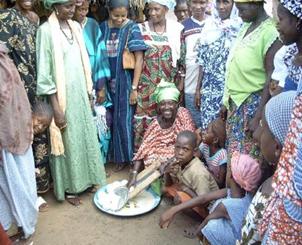 |
I presented her with her uniform and new backpack. She was incredibly grateful. She came to my house two times a day and told me she wants to study and learn how to read. I would give her homework that she never failed to finish and present to me with pride the next time she visited. She can now write her name, the entire alphabet and even some English words.”
But perhaps more than anything else, IFESH volunteers, like those who have served in the Peace Corps and other programs, learn valuable lessons about development and what it means to be an assistant or facilitator in the process. In following the philosophy of Rev. Sullivan, they work to leverage existing initiatives and resources. They also integrate themselves in their communities and discover that they, like all teachers, are learners as well. The lessons learned in Guinea are both big and small. William Chandler, 2003-04 TFA in Pita, experienced the amusing and simultaneously challenging state of being a porto (white man) in Africa. Johnavae Quinn, 2004-05 TFA in Dalaba, learned about Islam and its unique customs by living with a host family. Describing the Ramadan period, Quinn says: “I will always remember that the food was great and the prayer uplifting, but the most exciting part of my Ramadan experience was the fellowship. The choice to observe the holiday brought me closer to my family, colleagues and students.”
Some IFESH volunteers even meet their spouse in Guinea, while all establish connections and friendships that will last a lifetime. In working with her host sister Nenemba’s literary club and other self-help initiatives in Dalaba, 2003-04 TFA Alana Hairston was able to get involved in her community and contribute to local initiatives that will outlast the tenure of any one volunteer. This is the essence of the IFESH philosophy and Rev. Sullivan’s life’s work. Hairston states: “The time I spent in Guinea showed me what development really is. It is people taking the initiative to work together for the greater good of their community and the world at large. Guinea’s people, traditions and present day realities were extraordinary teachers.”
Though current events in Guinea are troubling and many former TFAs and Fellows expressed concern for the future of the country, IFESH, in the vein of Rev. Sullivan, believes in surmounting obstacles and persevering. The IFESH program in Guinea is actually growing, as more volunteers will be assigned during the 2005-06 academic year than ever before and in new areas (Dubréka and Kindia) in addition to the traditional posts in the Fouta Djalon and Conakry. Whatever challenges may lie ahead, IFESH endeavors to send volunteers to Guinea for years to come, supporting the country’s education system and “moving mountains” in the process.
For more information, including application forms for the TFA and International Fellows Programs, please contact the International Foundation for Education & Self-Help by telephone at 480-443-1800, or on the web at www.ifesh.org.
Genies Amoureux and Guinean Schoolgirls
Ellwood Colahan (Maci ’93-’96)
[email protected]
On October 28, 2005, the following short item appeared on the website of Radio Kankan:
“It is ten minutes after nine in the morning when a religious calm takes hold of the Aviation High School in Matoto. Twenty students have just fainted because of an inopportune visit from the amorous spirits [‘genies amoureux’] that continue to sweep down upon pretty schoolgirls. The only solution to the problem appears to be metaphysical.
“This phenomenon no longer surprises the teachers, school administrators and citizens of Conakry. For a long time, classes have been disturbed by the presence of these amorous spirits in middle schools and high schools. In 2004 the Tombo Primary School, with the highest female enrollment in Kaloum, received a surprise visit from the spirits, obliging the school to close for two days while the spirits’ ardor was appeased.
“Similarly, the Tannerie High School experienced an indescribable panic and dread among the teachers and students when the amorous spirits first appeared. When asked, the girls affected described them as handsome young men who introduce themselves and invite girls to accompany them. One of the victims was only found by her relatives thanks to the intervention of a grand marabout.
“Still, despite sacrifices offered by student’s families, as well as readings of the Holy Koran, these handsome seducers known as amorous spirits continue to hunt down pretty girls in the schools of the capital.”
This curious news item has stimulated much discussion among Guinea RPCVs, many of whom have observed such visitations at close hand. According to Cristi Carlstead (Koundara ’01-’03), “I too had problems with this at my school. In fact, we actually had to cancel classes because so many of our girls were ‘falling,’ as they called it. I must admit, it is an odd phenomenon.” Cristi described how the victim would first become stiff, and then begin to scream and thrash about as though she were fighting something off. Up to half a dozen boys would be needed to carry her out of the classroom and bring her to the infirmary. “When girls continued to ‘fall’ at a rate of two to three a day for two weeks, with the most being eight in one day, the officials finally decided to cancel school because the girls were too scared to come back. In order appease the devils that were at the root of this problem they then made contributions for a sacrifice of a cow. The blood was supposed to be a gift for/protection from the devils. Of course there was much debate about if the sacrifice had to be on school grounds or not. All in all it is an extremely odd situation, one which I could never quite believe I was living through.”
Others echoed Carlstead’s feeling of incredulity. “I've never really been able to reconcile it,” said Susan Martonosi (Koundara ’99-’01). “I don't really ‘believe’ in such spirits, and certainly things like this rarely happen in the States, so why should they happen so often in Guinea?” Martonosi allowed that she had been skeptical about the possessions, suspecting them to be a fad acted out by some of her less scholarly-inclined students. Like many volunteers, her experience as an American left her unprepared to accept phenomena such as spiritual possession at face value. “But on the other hand,” she said, “there seems to be a lot of mysticism in West Africa that is otherwise unexplainable.”
Jennifer Williams (Kissidougou/Seredou ’94-’96) never encountered these phenomena as a PCV, but she found an uncanny resonance in an unlikely place. “I teach high school English, American Lit, and every year we start off with The Crucible. I can't help but relate the similarities between the young women of Salem 1692, and these young women in Africa … they had no status in the community, no voice, until the accusations started (usually preceded by great fits, perceivably contagious, of being possessed by the ‘witches’ themselves who were products of the devil) and then the courts, the church, and community hung on every word they said.” Williams said historians have described the girls of Salem as “rock stars of their time.” “It's about the powerless getting power, attention, and ultimately a voice. Considering the rights of girls and women in Guinea there appear to be some similarities.”
“I had a very personal experience with this,” said Aaron Sharghi (Tiro/Kankan ’98-’01). He shared part of a letter he had written home earlier this year from Conakry, where he was living. He had been very concerned about Fatim, his thirteen-year-old “little sister” from his Guinean family. “About six weeks ago, I got a phone call that Fatim had ‘fallen.’ During a period of a few hours at school, she ripped up her uniform, bit her teacher, and was restrained by several people of which she remembers nothing.” Aaron had taken a strong personal interest in Fatim, who had grown up in an unfavorable family situation. He had convinced her family to send her to school and later financed her enrollment in a private school.
“This all seems very bizarre to me and every Westerner that I have discussed this with; however to the Guinean, even those who are educated, this is perfectly normal. ‘It’s devils that do this,’ they say. ‘You are wasting your money to take her to the doctor; that won't help,’ they say. ‘The devil is the same devil that used to follow her father,’ Fatim's aunt explains. ‘This medicine works the best; we got it here in Conakry. This one, we got from the village. This one, we got from another medicine man and Fatim took it and vomited. This one, we also got in Conakry, but it doesn't work so well. We know someone who is going to Dakar, and we are going to give him money to seek a reliable remedy.’ ”
Later Fatim described to Aaron what it was like when she “fell.” “She tells me how this devil has been with her for a very long time – she knows him very well. The devil wants to marry her, doesn't want children, and offered her a ring and a necklace, however she refused this. Sometimes, she likes to flirt with the boys, but the devil really gets angry when this happens and makes her ‘fall.’ Also, touching her on the back of her neck can cause her to ‘fall.’ The devil watches her, sometimes taking the form of a human being. She doesn't want to fall, but she can't do anything to control it.” Aaron came to see Fatim’s problem as a psychological one. He was able to help her by encouraging her to focus on her positive spiritual beliefs, on her responsibilities and her hopes for the future. Today, he says, she is much better. She is living in Thiès, Sénégal and attending a private school there.
It is clear that these states of possession are not uncommon among Guinean schoolgirls, and remain one of the most bizarre experiences American volunteers may encounter in Guinea.
|
Buy a calendar! FOG is raising funds for Volunteer projects by selling the 2006 International Calendar. These calendars are $15 each, or $12 each when ordering quantities of 3 or more. They make great Christmas gifts and all the proceeds go to fund the projects, so order one now! Order online at: http://www.friendsofguinea.org/calendars.shtml with your credit card, and if you would like to pay with a check, there is a form on that page you can print out and mail in. Please order by November 30th to receive your calendar by Christmas. |
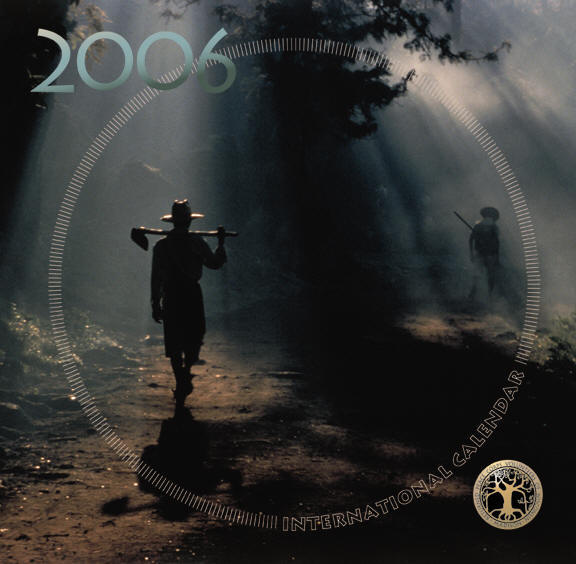 |
Membership Report
Stephanie Chasteen (Wawaya, ‘97–’99)
Membership Coordinator
membership @ friendsofguinea.org
We currently have 225 members in Friends of Guinea!
• 78 are couples
• 40 are Guineans in Guinea
• 18 are newly returned RPCVs
• 44 have been with us since we were founded in 2001!
Watch this space in future months for a short column highlighting the experiences of some our members.
Have an interesting story to tell? Email it to Stephanie at membership @ friendsofguinea.org.
Listserv Report
Urska Manners (Siguiri, ‘00–‘02)
listserv @ friendsofguinea.org
RPCV Listservs: Ever wonder what happened to the other volunteers you served with? Now you can find out. Friends of Guinea is offering a new listserv service which allows Guinea RPCVs to communicate and reconnect with the other volunteers
in their training group. Lists exist for every group going back to the '60's.
Additionally, there is a listserv for trainees who will soon be departing to Guinea. If you would like to be added to the RPCV listserv, send an email to listserv @ friendsofguinea.org along with your year of entry to Guinea.
Le Griot Nous Dit…
On October 28 Karen Pilliod (‘96–‘98) married Drew Voetsch, whom she met while in grad school at UNC. A healthy contingent of Peace Corps friends attended the big event in NYC
Brian McKenna (Bounouma ‘96-‘98) and his wife Tracy welcomed a baby boy, Timothy Aiden McKenna into the family on October 8, 2005.
Gender Conference Funding Complete!
Just before press, the word came through: Funding for the 2005-2006 Peace Corps Guinea Gender Conferences has been completed. The amount sought was $9,893. $2,095 was donated directly to PCPP. Friends of Guinea had $3,845 left over from last year’s fundraising and through the cloth auction, calendar sales, and other donations, was able to raise enough to put us over the top with an estimated $400 to spare.
Much thanks to Projects Coordinator Claire Lea and everyone else who helped out on this. Special thanks to Agnes Kirchgasler, Kate Guelker-Cone, Diane Carlson, Elizabeth Curtz and Stephen Thane, all of whom donated $200 or more.
Free Classifieds in ÇaVa?!
All members in good standing of Friends of Guinea are entitled to one free personal advertisement per year in ÇaVa?, the quarterly newsletter of Friends of Guinea. These advertisements are limited to 21 words are intended primarily as a way for families and friends to send messages of support and encouragement to volunteers serving in Guinea, although they might equally be used to broadcast other messages. We encourage you to take advantage of this free service by emailing your message of 21 words or less to the Newsletter Editor at [email protected]. Please note that this service is available only to current members of Friends of Guinea, so please submit your advertisement under the name in which your membership is listed so that we may verify your status.
